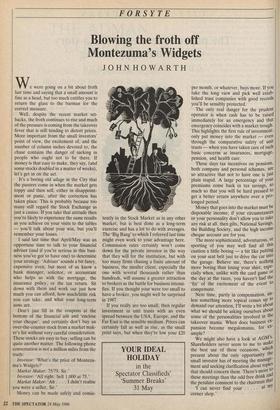FORSYTE
Blowing the froth off Montezuma's Widgets
JOHN HOWARTH
We were going on a bit about froth last time and saying that a small amount is fine as a head, but too much entitles you to return the glass to the barman for the correct measure.
Well, despite the recent market set- backs, the froth continues to rise and much of the pressure is coming from the takeover fever that is still tending to distort prices. More important from the small investors' point of view, the excitement of, and the number of column inches devoted to, the chase contains the danger of sucking in people who ought not to be there. If money is that easy to make, they say, (and some stocks doubled in a matter of weeks), let's get in on the act.
It's a boring old adage in the City that the punters come in when the market gets toppy and then sell, either in disappoint- ment or panic, after the correction has taken place. This is probably because too many still regard the Stock Exchange as just a casino. If you take that attitude then you're likely to experience the same results as you achieve on your visits to the tables — you'll talk about your win, but you'll remember your losses.
I said last time that April/May was an opportune time to talk to your financial adviser (and if you're serious in this busi- ness you've got to have one) to determine your strategy. 'Adviser' sounds a bit fancy, expensive even, but most of us know a bank manager, solicitor, or accountant who helps us with the mortgage, the insurance policy, or the tax return. Sit down with them and work out just how much you can afford, how much/little risk you can take, and what your long-term aims are.
Don't just fill in the coupons at the bottom of the financial ads and 'enclose your cheque', and certainly don't buy an over-the-counter stock from a market mak- er's list without very careful consideration. These stocks are easy to buy; selling can be quite another matter. The following phone conversation is not a million miles from the truth: Investor: 'What's the price of Montezu- ma's Widgets?'
Market Maker: 75/79, Sir.'
Investor: 'All right. Sell 1,000 at 75.' Market Maker: `Ah . . . . I didn't realise you were a seller, Sir.'
Money can be made safely and consis- tently in the Stock Market as in any other market, but is best done as a long-term exercise and has a lot to do with averages. The 'Big Bang' to which I referred last time might even work to your advantage here. Commission rates certainly won't come down for the private investor in the way that they will for the institution, but with too many firms chasing a finite amount of business, the smaller client, especially the one with several thousands rather than hundreds, will assume a greater attraction to brokers as the battle for business intensi- fies. If you thought your were too small to have a broker, you might well be surprised in 1987.
If you really are too small, then regular investment in unit trusts with an even spread between the USA, Europe, and the Far East is the sensible medium. Prices can certainly fall as well as rise, as the small print says, but when they're low your £20 per month, or whatever, buys more. If you take the long view and pick well estab- lished trust companies with good records you'll be sensibly protected. The only real danger for the prudent operator is when cash has to be raised immediately for an emergency and that emergency coincides with a market trough. This highlights the first rule of investment: only put money into the market — even through the comparative safety of unit trusts — when you have taken care of such basic concerns as insurances, mortgage, pension, and health care.
These days tax incentives on pensions, both company and personal schemes, are so attractive that not to have one is just plain stupid. A large percentage of your premiums come back in tax savings, so much so that you will be hard pressed to get a better return anywhere over a pro- longed period. Money that goes into the market must be disposable income; if your circumstances or your personality don't allow you to take any risk at all, then gilts, National Savings, the Building Society, and the high income cheque account are for you. The more sophisticated, adventurous, or sporting of you may well find all this caution a little boring — a bit like putting on your seat belt just to drive the car into the garage. Believe me, there's nothing more boring than losing your shirt, espe- cially when, unlike with the card game or the day at the races, you haven't had the `fix' of the excitement of the event to compensate.
Next time, partly in compensation, un- less something more topical comes up to demand our attention, I'll write a bit about what we should be asking ourselves about some of the personalities involved in the takeover mania. When does business ex- pansion become megalomania, for ex- ample? We might also have a look at AGM's. Shareholders never seem to me to make the best use of these occasions, which present about the only opportunity the small investor has of meeting the manage- ment and seeking clarification about topics that should concern them. There's more ro. these meetings than the odd free drink and the petulant comment to the chairman that `I can never find your at my corner shop.'














































 Previous page
Previous page